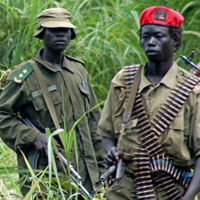
Current situation
While there has been some progress on the northern Uganda peace process taking place in Juba, southern Sudan, the situation on the ground remains grim. Even though one thousand Ugandans die each week from malnutrition, violence and disease, humanitarian assistance is being scaled back, LRA atrocities and abductions continue in southern Sudan, and the threat of renewed violence looms over northern Uganda, the Democratic Republic of Congo, and even the Central African Republic. The Juba peace process is the best hope for northern Ugandans, but many remain skeptical that it can succeed without greater U.S. involvement.
Key players:
Lord’s Resistance Army (LRA) – The LRA is led by the brutal and unpredictable Joseph Kony. Kony, his few disciples, and an army composed principally of abducted children have tormented northern Ugandans for 20 years through systematic abductions, torture, mutilation, rape, and murder that have displaced over one and a half million people. The LRA does not have a clear political agenda and has served as an “army for hire” by the Sudanese government in southern Sudan. Most LRA forces are in southern Sudan or Congo, representing a grave threat to regional security.
Government of Uganda – With his eye on the upcoming international summit in Kampala this November, Ugandan President Yoweri Museveni is more willing than ever to strike a deal to end the war, as he will have the eyes of the world on Uganda at that time and will want to showcase Uganda as the success story of Africa.
United States – Without the U.S., there is no chance for peace, given that the U.S. is the most important external ally of President Museveni and is one of the outside actors most feared by the LRA. Unfortunately, the U.S. has not devoted significant resources to ending the conflict.
United Nations – Through a special envoy, former Mozambican president Joaquim Chissano, the UN has become much more engaged in the Juba process.
International Criminal Court (ICC) – The International Criminal Court is investigating crimes against humanity in northern Uganda and has issued arrest warrants against Kony and his top lieutenants. The resulting pressure helped push Kony to the negotiating table.
You! – Absent political pressure from concerned American citizens, and absent serious leadership and demands from the U.S. Congress, it is unlikely that the Bush administration will significantly step up its involvement in support of peace in northern Uganda.
Fixing the Peace Process — The WHO, WHAT, and HOW of Peace-making
The peace process, as presently structured, contains the seeds of its own demise. Reforming the process and building a broader peace strategy requires understanding the current flaws. The Juba process involves the wrong participants, the wrong issues, and inadequate leverage – the WHO, WHAT and HOW of peace-making.
WHO?
The participants in the peace process from the LRA side are Ugandans from the diaspora and do not represent the fighters on the ground.
What’s the solution? — A successful peace initiative will have to deal directly with Kony and engage in shuttle diplomacy between Kony and President Museveni.
WHAT?
The agenda of the Juba talks is weighed down by issues on which the LRA has no right to represent the people of northern Uganda, such as all of the political, economic, and developmental issues that
must ultimately be addressed in a wider process.
What’s the solution? – A two phase process is needed. First is a simple deal that addresses Kony’s core concerns: security for himself and the other indicted commanders, and livelihood opportunities for all of the LRA. A second phase that should follow such an agreement must also address some of the issues that will help northern Uganda develop.
HOW?
The Juba process lacks a mechanism for international leverage to be applied to the parties.
What’s the solution? – A series of actions that include: 1) sending a senior U.S. official to work in direct support of the Juba process; 2) investigating and sanctioning sources of support for the LRA; and 3) military planning focused on how to arrest and pressure the LRA
leadership if it is responsible for the demise of the peace process.

